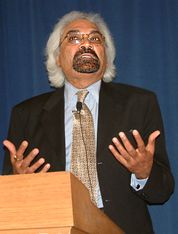A good article by Sam Pitroda

Here's a really nice article that came out in The Economic Times today.
Describing the hype over the BPO industry in India as exaggerated and unrealistic, National Knowledge Commission chairperson Sam Pitroda has said the industry generated only 300,000 jobs a year against the 10 million required annually to counter unemployment .
Speaking to the BBC Hindi service, the man credited with ushering in the telecom revolution in India said the Commission was likely to submit a report next month to Prime Minister Manmohan Singh recommending university education reforms to check unemployment and promote research.
"India needs to generate 10 million jobs each year to counter growing unemployment and to build a world level skilled work force. However, merely three lakh (300,000) jobs are being created through outsourcing by foreign companies in the IT sector here.
"BPOs are a recent phenomenon and have been blown out of proportion. The attention given to outsourcing is a bit exaggerated," he told listeners from around the world.
"Let us be very clear that the country cannot run on outsourced jobs, we would have to look for serious alternatives. By running after outsourced jobs we are merely solving the problems of others, we should not forget that solutions to our problems would have to be provided by us only."
He said India's priority would have to be water, sanitation, energy, construction and health sectors, and outsourcing did not provide the answers to these issues.
Asked whether countries like China and the Philippines posed a threat to India in outsourced jobs, Pitroda urged the Indian BPO industry to go into newer areas saying: "Competition is on the rise worldwide, and a global outlook is preferred in all the professions... The BPO industry in India should look for new fields. Our cities became the outsourcing centres of the world, now our cities should make villages as their centres."
According to the tech guru, reforms in higher education were required at the earliest to counter unemployment and promote research. He said only six percent of youngsters in the relevant age group were pursuing higher education, and added that the number would have to at least increase threefold.
"Presently the Knowledge Commission is conducting a census on this, as we feel that a quantitative as well as qualitative increase in university education throughout the country is compulsory.
"We cannot move forward without this and the question is how fast could we do these reforms. By next month we would like to submit a report recommending university reforms," Pitroda said.
Asked about the possible sources of funding required, he replied: "We should invite foreign investment, look for collaborations, go in for more private universities, then only would we be able to bring back higher education into focus.
"We should not forget that almost half of the country's population is going to be less than 25 years of age, and by good university education we would be preparing a knowledge base for not just our country but for the world. I can say with reasonable surety that in 10 years, India's youth would be important for the world's development".
Citing the decrease in research work in the universities as an alarming sign for the country, Pitroda said the interest of the youth would have to be won back.
"Unfortunately now the research is being increasingly separated from the universities. No major research work is being done and the research scholars are on a decline. We would have to check this trend by giving more financial incentives and facilities for research."
Manmohan Singh constituted the Knowledge Commission last year to advise him on how India can meet knowledge challenges in this century in areas like education, scientific institutions, intellectual property and agriculture.
For more on India's history and future, including some searching stuff on the economy, I strongly recommend Amartya Sen's 'The Argumentative Indian'. Classy stuff.

0 Comments:
Post a Comment
<< Home